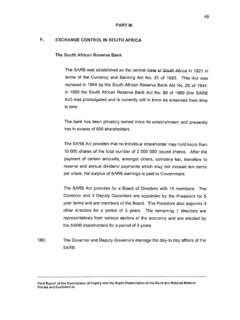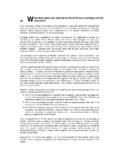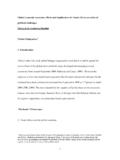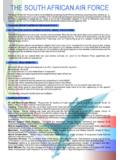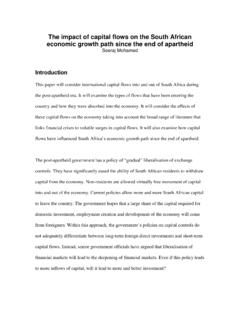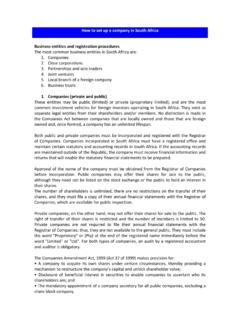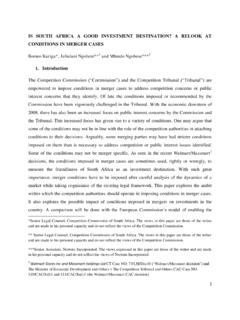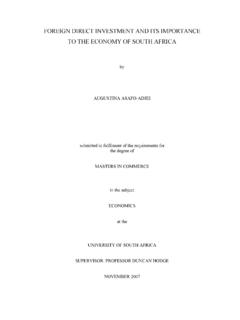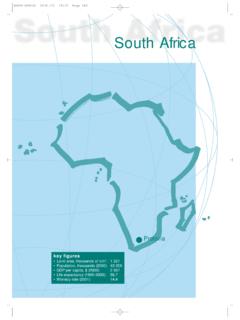Transcription of Part I: Exchange Control Index - justice.gov.za
1 Part I: Exchange Control Index Page Introduction 1 Recommendations of the authorised dealers regarding the administration of Exchange Control 7 Recommendations of the Reserve Bank regarding the administration of Exchange Control 15 Compliance by the authorised dealers 16 Reserve Bank s response to the comments of the authorised dealers 35 KPMG investigation into Exchange Control administration 38 Liberalisation of Exchange controls 53 Table of annexures to Part I
2 Annexure Statement by Mr Bruce-Brand of Exchange Control A KPMG report on Exchange Control administration B Commission of Inquiry into the rapid depreciation of the Exchange rate of the rand and related matters: Final Report dated 30 June 2002 1I Exchange controls [1] Introduction 1 A concise, but comprehensive, review of Exchange controls in south Africa is contained in the statement (confirmed in evidence)1 of Mr Bruce-Brand, general manager, the Exchange Control department ( Exchange Control ) of the Reserve Bank. A copy is attached as Annexure A to Part I. Only matters of material interest to the Commission are dealt with below. 2 south Africa has had Exchange controls since 1939. The applicable legislation at present is the Currency and Exchanges Act, 9 of 1933. Section 9(1) of that Act provides that the [President] may make regulations in regard to any matter directly or indirectly relating to or affecting or having any bearing upon currency, banking or exchanges.
3 The Exchange Control Regulations ( the Regulations ) were promulgated in 1961 and are amended from time to time. The Minister of Finance issues Orders and Rules under the Regulations. 1 Bruce Brand, Bundle SARB (06) 3, Record 534 1 Commission of Inquiry into the rapid depreciation of the Exchange rate of the rand and related matters: Final Report dated 30 June 2002 23 Exchange Control policy is determined by the Minister of Finance. The application of the policy is refined in consultation with the Governors of the Reserve Bank. The Minister of Finance has delegated to the Governor, a Deputy-Governor, the general manager and various officials of Exchange Control the powers, functions and duties assigned to and imposed on the National Treasury under the Regulations. Exchange Control is responsible for the day-to-day administration of Exchange Control .
4 4 The Minister of Finance has appointed banks to act as authorised dealers in foreign Exchange subject to conditions and within limits prescribed by Exchange Control . Authorised dealers are not the agents of Exchange Control but act on behalf of their customers. 5 Exchange Control has issued Exchange Control Rulings ( the Rulings ) which contain administrative measures as well as the permissions, conditions and limits applicable to transactions in foreign Exchange which may be taken by authorised dealers. The Rulings are amended from time to time by way of Exchange Control circulars ( the Circulars ). In 1990 the Exchange Control Manual ( the Manual ) was issued by the Reserve Bank to assist authorised dealers. The Manual 2 Commission of Inquiry into the rapid depreciation of the Exchange rate of the rand and related matters: Final Report dated 30 June 2002 3serves as a general guideline and does not supersede the Regulations, Rulings, Circulars and so 6 Applications for foreign Exchange received by authorised dealers from their customers are dealt with by them if the applications fall within the parameters outlined in the Rulings without reference to Exchange Control .
5 Applications by customers of the authorised dealers in foreign Exchange which fall outside the scope of the Rulings must be referred to Exchange Control for adjudication. 7 The purpose of Exchange Control is: - to ensure the repatriation into the south african banking system of all foreign currency acquired by residents of south Africa; - to prevent the loss of such foreign currency resources through the transfer abroad of real or financial capital assets held in south Africa; - to effectively Control the movement into and out of south Africa of financial and real assets while at the same time not interfering with the efficient operation of the commercial, industrial and financial systems of the country. 2 The Regulations, Rulings and Circulars are collectively referred to in this report as Exchange Control rules.
6 3 Commission of Inquiry into the rapid depreciation of the Exchange rate of the rand and related matters: Final Report dated 30 June 2002 4 8 After 1994, the south african Government decided on a gradual approach to the elimination of Exchange controls rather than a big-bang approach. A phased approached allowed Government more time to implement other policy changes in order to achieve the pre-conditions necessary for a successful abolition of Exchange Control . 9 Government decided that the logical sequencing for the liberalisation of Exchange controls would be:- (1) the abolition of Exchange Control on all current account transactions (ie import and export of goods and services); (2) the abolition of Exchange Control on non-residents; (3) gradually becoming more lenient in the approval of applications for direct foreign investment by south african corporates; (4) allowing institutional investors to acquire foreign assets to diversify their total portfolio investment; (5) a progressive relaxation of all other controls on resident individuals; and (6) to release emigrants blocked funds.
7 4 Commission of Inquiry into the rapid depreciation of the Exchange rate of the rand and related matters: Final Report dated 30 June 2002 5 Steps (1) and (2) have been implemented, steps (3), (4) and (5) are in the process of implementation and step (6) has not yet been looked at . 3 Dr Stals estimated that about 70% of the Exchange controls that existed in 1979 have been 10 The Exchange controls which still exist are analysed in the statement of Mr Bruce Brand. For the purposes of the Commission, these are the pertinent remaining Exchange controls:- (1) Corporates Corporates are allowed, on application, to transfer up to R750 million from south Africa for each new and approved investment in Africa, provided a longer term benefit to south Africa can be demonstrated. In respect of investments elsewhere in the world, corporates are limited to the transfer from south Africa of up to R500 million per new approved investment subject to the same criteria.
8 Corporates, on application to the Department, are also allowed to utilise their local cash holdings in south Africa to partly finance new investments where the cost thereof exceeds the respective amounts of R750 million and R500 million. Such additional 3 Bruce Brand, Record 550 4 Evidence of Stals, Record 266 5 Commission of Inquiry into the rapid depreciation of the Exchange rate of the rand and related matters: Final Report dated 30 June 2002 6foreign currency transfers are restricted to 10% of the cost of the investment in excess of those amounts irrespective of the size of the transaction. The balance of the finance required must still be raised abroad on the basis outlined above. Corporates wishing to invest in countries outside the CMA5 may also apply for permission to enter into corporate asset/share swap and share placement transactions to acquire foreign investments.
9 (2) Institutional Investors Long term insurers and pension funds may under application acquire foreign portfolio assets of up to 15% of their total assets and registered fund managers up to 15% of their total assets under management, subject to the regulatory framework within which they operate. Unit trusts through unit trust management companies may under application acquire foreign portfolio assets of up to 20% of their total assets under management, subject to the regulatory framework within which they operate. The foreign portfolio assets may be acquired by transferring foreign currency from south Africa abroad. Such transfers are limited to 10% of the previous calendar year s net cash flow. (3) Individuals 5 Common Monetary Area which includes south Africa, Lesotho, Namibia and Swaziland 6 Commission of Inquiry into the rapid depreciation of the Exchange rate of the rand and related matters: Final Report dated 30 June 2002 7 Individuals may invest up to R750 000 per individual for any purpose outside the CMA provided the party is over eighteen years old and a registered taxpayer in good standing.
10 11 Cross-border (onshore/off-shore) foreign Exchange transactions executed by authorised dealers on behalf of their customers are reported to the Reserve Bank on a daily basis. These are called reportable transactions . On-shore/on-shore and off-shore/off-shore transactions are not reportable. On-shore/on-shore transactions comprise inter-bank transactions. Off-shore/off-shore transactions take place outside of south Africa. The Reserve Bank is therefore not able to report on them as it has no source of information or jurisdiction over non-residents. [2] Recommendations by authorised dealers 12 The authorised dealers were asked the following question in the Questionnaire:6 What recommendations do you have regarding the administration of Exchange Control ? The evidence of the material authorised dealers in response to that question was as follows:- Absa 6 The Questionnaire prepared by the Deloitte & Touche team.










